After listening to more than two hours of opposition to a new code that would limit solar energy production systems to industrial zones, Riverhead Town Board members are rethinking the proposal.
The proposed code would prohibit commercial solar energy production systems in all but the town’s industrial zoning use districts. Systems designed to produce electricity for sale under a purchase agreement with a utility company would be allowed as-of-right in Industrial A and B zones and by special permit in the Industrial C zone.
Commercial solar production systems are currently not specifically permitted in any of Riverhead’s zoning use districts.
Solar installations intended to produce energy for on-site consumption to reduce energy costs are permitted, however, and the proposed code would not affect them, town attorney Bob Kozakiewicz explained.
“Solar farms” are considered manufacturing, Kozakiewicz said. The board was looking to prohibit such installations in agricultural and residential zones, he said.
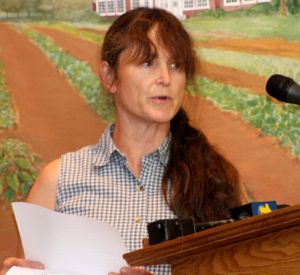 But farmers and growers objected to an overall ban on farmland.
But farmers and growers objected to an overall ban on farmland.
L.I. Farm Bureau president Karen Rivara delivered the Farm Bureau’s message opposing the proposal, which she said would unfairly restrict farmers’ use of their land and prevent them from supplementing their farm income — something necessary to sustain farming, she said.
Supervisor Sean Walter questioned Farm Bureau’s opposition to Riverhead’s proposed new code, which he said was “90 percent the same as the Town of Southold’s code,” which drew no opposition, he said.
“This code’s been completed vetted in Southold,” he said.
Rivara said Southold’s code “happened faster than anybody had time to react to it.”
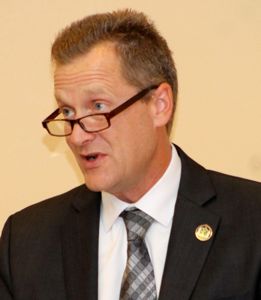 Walter said he believes solar production could “kill farming” because power companies “will pay way more than the average farmer could pay to lease land.” That would drive the price of land so high, there’s no way farmers could compete, he said.
Walter said he believes solar production could “kill farming” because power companies “will pay way more than the average farmer could pay to lease land.” That would drive the price of land so high, there’s no way farmers could compete, he said.
“I see this as preserving farming,” Walter said of the proposed code.
Rivara said the supplemental income would help farmers survive and, since the solar production uses would not be permanent, the farmland would be preserved for future generations.
Councilwoman Jodi Giglio said she’d support the use on agricultural land if it were limited to a small percentage of a farm’s total acreage.
Rivara said Farm Bureau would just like to have a dialogue with the town about the proposed regulations.
The supervisor said in the past few months he’s seen proposals for “conservatively speaking, 2,000 acres of farmland” proposed for solar energy production.
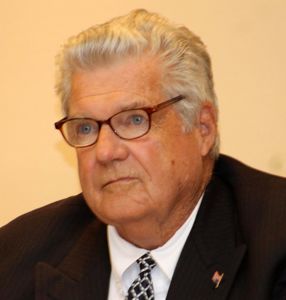 Councilman John Dunleavy expressed concerns about the visual impacts of solar farms.
Councilman John Dunleavy expressed concerns about the visual impacts of solar farms.
“We’re an agricultural community,” he said. “We bought thousands of acres, development rights on acres, to keep it agricultural so when people come out here from the west and NYC, it’s like driving upstate — all they see is nice farms on Sound Avenue and it’s all open space. We want to keep it that way,” Dunleavy said. “We don’t want solar panels along Sound Avenue because you’re taking the ruralness out of the East End and bringing it back into manufacturing and commercial uses.”
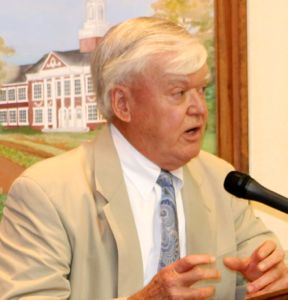 Riverhead attorney Peter Danowski said the town should allow the solar farms “everywhere” but determine the minimum acreage and the maximum lot coverage allowed and limit the impacts of solar farms in that manner.
Riverhead attorney Peter Danowski said the town should allow the solar farms “everywhere” but determine the minimum acreage and the maximum lot coverage allowed and limit the impacts of solar farms in that manner.
The existing substations only have so much capacity, Danowski said. “Locate them on a map, look at the number of tie-ins to those substations that would be allowed using the existing improvements,” he said.
“It will be self-limiting. With the existing infrastructure, with the existing substations, without major upgrades that are economically not feasible, you can’t tie in more than a couple of small projects,” Danowski said.
He urged the board to “revisit the issue promptly” and “get a formula that works for everybody.”
Anthony Caggiano, of the L.I. Nursery Landscape Association, said the “restrictions” being contemplated would “adversely affect the value of agricultural rights” in the Town of Riverhead. Solar farms will help farmers and growers stay in business, Caggiano said.
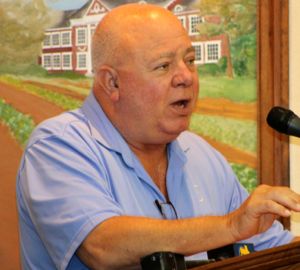 L.I. Farm Bureau executive director Joe Gergela said farmers are living through “difficult economic times and it’s across the board,” he said.
L.I. Farm Bureau executive director Joe Gergela said farmers are living through “difficult economic times and it’s across the board,” he said.
“Every commodity group is having trouble due to escalating costs and stagnant prices. Farmers are not able to get the return of what they’re putting out in the fields,” he said.
Solar production is an opportunity “to generate nonfarm income to help keep the farm operating and to keep that farmland undeveloped,” Gergela said.
“We’re asking you to talk with us before you finalize this.”
The hearing record was left open for 10 days for written comment.
The survival of local journalism depends on your support.
We are a small family-owned operation. You rely on us to stay informed, and we depend on you to make our work possible. Just a few dollars can help us continue to bring this important service to our community.
Support RiverheadLOCAL today.


































